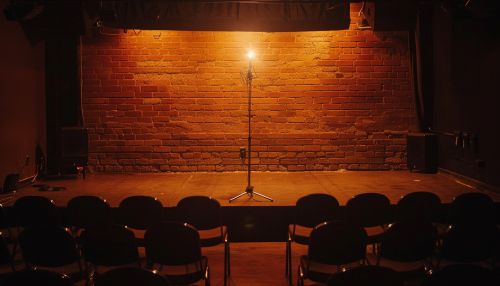Stand-up comedy
Origins and history
Stand-up comedy, as an art form and entertainment medium, has a rich and varied history. The roots of stand-up comedy can be traced back to the classic oratory of the ancient Greeks, where individuals would use humor and satire to discuss political or social issues. This tradition continued through the Middle Ages and into the Renaissance, with jesters and court fools serving a similar role in European courts. However, the modern form of stand-up comedy, where a comedian performs in front of a live audience, delivering a monologue of humorous stories, jokes, and one-liners, originated in the United States in the late 19th and early 20th centuries.


In the early days, stand-up comedy was primarily a feature of vaudeville shows, a type of entertainment popular in the United States and Canada from the early 1880s until the early 1930s. Comedians would perform alongside other acts like singers, dancers, and magicians. These early stand-up performances were often more akin to comedic monologues than the joke-driven format that is prevalent today.
The 20th century saw a shift in the style and delivery of stand-up comedy. The 1950s and 1960s, often referred to as the "Golden Age of Comedy," saw the rise of comedians like Lenny Bruce, George Carlin, and Richard Pryor, who pushed the boundaries of what was considered acceptable in comedy. They tackled controversial topics like race, politics, and religion, using comedy as a tool for social commentary.
In the 1970s and 1980s, stand-up comedy saw a boom in popularity, with comedy clubs opening across the United States. This period also saw the rise of televised stand-up specials, with networks like HBO and Comedy Central providing a platform for comedians to reach a wider audience.
The 21st century has seen the continued evolution of stand-up comedy, with the internet and streaming platforms providing new avenues for comedians to reach audiences. Stand-up comedy has also become more diverse, with more women, people of color, and LGBTQ+ comedians gaining prominence.
Styles and formats
There are several different styles and formats of stand-up comedy, each with its own unique characteristics.
One of the most common styles is the "setup-punchline" format, where the comedian sets up a situation or premise, and then delivers a punchline that subverts the audience's expectations. This style is often used in one-liner jokes and can be seen in the work of comedians like Steven Wright and Mitch Hedberg.
Another popular style is observational comedy, where the comedian comments on everyday situations, social norms, or human behavior. This style is often used by comedians like Jerry Seinfeld and Ellen DeGeneres, who draw humor from the absurdity of everyday life.
Storytelling is another common format in stand-up comedy. In this style, the comedian tells a humorous story or anecdote, often drawing from their own personal experiences. This style is often used by comedians like Bill Cosby and Dave Chappelle.
In addition to these styles, there are also several sub-genres of stand-up comedy, including political comedy, dark comedy, clean comedy, and alternative comedy.
Stand-up comedy around the world
While stand-up comedy originated in the United States, it has since spread around the world, with each country developing its own unique style and tradition of stand-up comedy.
In the United Kingdom, stand-up comedy has a long history, with roots in the music hall tradition of the 18th and 19th centuries. British stand-up comedy often features a mix of observational humor, wordplay, and satire. Notable British comedians include Billy Connolly, Eddie Izzard, and Ricky Gervais.
In Canada, stand-up comedy has been influenced by both British and American styles. Canadian comedians often incorporate elements of storytelling and observational humor into their routines. Notable Canadian comedians include Jim Carrey, Norm Macdonald, and Russell Peters.
Stand-up comedy is also popular in Australia, with a strong tradition of observational and character-based comedy. Notable Australian comedians include Tim Minchin, Hannah Gadsby, and Jim Jefferies.
In recent years, stand-up comedy has also gained popularity in non-English speaking countries. In these countries, comedians often incorporate local cultural references and language-specific wordplay into their routines.
Impact and influence
Stand-up comedy has had a significant impact on popular culture and society. Comedians have often used their platform to comment on social and political issues, using humor to challenge norms and provoke thought.
Stand-up comedy has also influenced other forms of entertainment. Many comedians have transitioned into acting, writing, and producing, bringing their comedic sensibilities to television, film, and literature.
Stand-up comedy has also been used as a form of therapy, with comedians often using their routines to process personal experiences and emotions. This has led to the development of "comedy therapy," a form of therapy that uses humor to help individuals cope with stress and anxiety.
